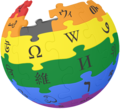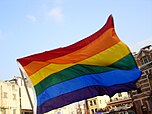
Back بوابة:مجتمع الميم Arabic Portal:LGBT Azerbaijani Партал:ЛГБТ Byelorussian Партал:ЛГБТ BE-X-OLD প্রবেশদ্বার:এলজিবিটি Bengali/Bangla Porched:Revelezh (LGBT) Breton دەروازە:کۆمەڵگەی پەلکەزێڕینە CKB Portal:Homo- und Bisexualität German Portal:LGBT DIQ Πύλη:ΛΟΑΤ Greek
| Main page | WikiProjects & Things you can do |

|
The LGBTQ+ Portal |

|

|

|
Introduction LGBT is an initialism that stands for "lesbian, gay, bisexual, and transgender". It may refer to anyone who is non-heterosexual, non-heteroromantic, or non-cisgender, instead of exclusively to people who are lesbian, gay, bisexual, or transgender. A variant, LGBTQ, adds the letter Q for those who identify as queer (which can be synonymous with LGBT) or are questioning their sexual or gender identity. Another variation, LGBTQ+, adds a plus sign "represents those who are part of the community, but for whom LGBTQ does not accurately capture or reflect their identity". Many further variations of the acronym exist, such as LGBT+ (simplified to encompass the Q concept within the plus sign), LGBTQIA+ (adding intersex, asexual, aromantic and agender), and 2SLGBTQ+ (adding two-spirit for a term specific to Indigenous North Americans). The LGBT label is not universally agreed to by everyone that it is generally intended to include. The variations GLBT and GLBTQ rearrange the letters in the acronym. In use since the late 1980s, the initialism, as well as some of its common variants, functions as an umbrella term for marginalized sexualities and gender identities. LGBT is an adaptation of LGB, which in the mid-to-late 1980s began to replace the term gay (or gay and lesbian) in reference to the broader LGBT community. When not inclusive of transgender people, the shorter LGB is still used. (Full article...) Selected article -The Stonewall riots, also known as the Stonewall uprising, Stonewall rebellion, or simply Stonewall, were a series of spontaneous, violent demonstrations against a police raid that took place in the early morning hours of June 28, 1969, at the Stonewall Inn, in the Greenwich Village neighborhood of New York City. Although they were not the first instance in American history when people in the homosexual community fought back against a government-sponsored system that persecuted sexual minorities, they have become the defining event that marked the start of the gay rights movement in the United States and around the world. American gays and lesbians in the 1950s and 1960s faced a legal system more anti-homosexual than those of some Warsaw Pact countries. Early homophile groups in the U.S. sought to prove that gay people could be assimilated into society, and they favored non-confrontational education for homosexuals and heterosexuals alike. The last years of the 1960s, however, were very contentious, as many social movements were active, including the African American Civil Rights Movement, the Counterculture of the 1960s, and antiwar demonstrations. These influences, along with the liberal environment of Greenwich Village, served as catalysts for the Stonewall riots. (Full article...)Selected biography -Joan Chandos Baez (/baɪz/ BYZE, Spanish: [ˈbaes]; born January 9, 1941) is an American singer, songwriter, musician, and activist. Her contemporary folk music often includes songs of protest and social justice. Baez has performed publicly for over 60 years, releasing more than 30 albums. Baez is generally regarded as a folk singer, but her music has diversified since the counterculture era of the 1960s and encompasses genres such as folk rock, pop, country, and gospel music. She began her recording career in 1960 and achieved immediate success. Her first three albums, Joan Baez, Joan Baez, Vol. 2 and Joan Baez in Concert, all achieved gold record status. Although a songwriter herself, Baez generally interprets other composers' work, having recorded songs by the Allman Brothers Band, the Beatles, Jackson Browne, Leonard Cohen, Woody Guthrie, Violeta Parra, the Rolling Stones, Pete Seeger, Paul Simon, Stevie Wonder, Bob Marley, and many others. She was one of the first major artists to record the songs of Bob Dylan in the early 1960s; Baez was already an internationally celebrated artist and did much to popularize his early songwriting efforts. Her tumultuous relationship with Dylan later became the subject of songs from both and generated much public speculation. On her later albums she has found success interpreting the work of more recent songwriters, including Ryan Adams, Josh Ritter, Steve Earle, Natalie Merchant, and Joe Henry. (Full article...)Selected quote -
Current events
Selected image - U.S. president Jimmy Carter with Andy Warhol in 1977. Warhol was famous worldwide for his work as a painter, an avant-garde filmmaker, a record producer, an author and a public figure. He was one of the first major U.S. artists to be open about being gay.
Did you know… -
This month's birthdays
Selected lists
Related portalsFeatured contentThe following articles and lists have been identified as some of the best produced by the Wikipedia community:
TopicsCategoriesAssociated WikimediaThe following Wikimedia Foundation sister projects provide more on this subject:
Discover Wikipedia using portals |
© MMXXIII Rich X Search. We shall prevail. All rights reserved. Rich X Search























